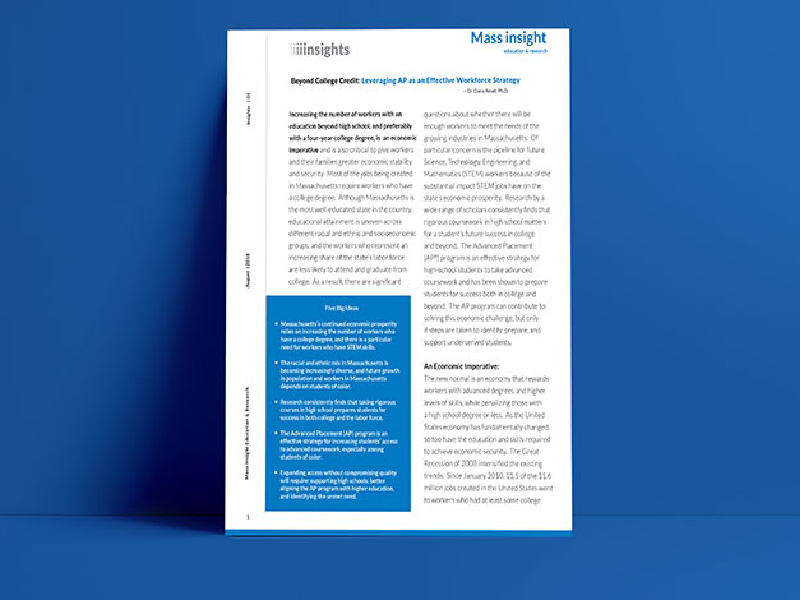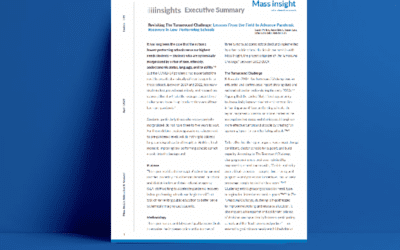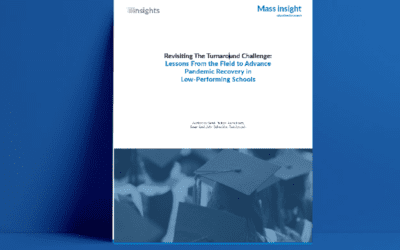What does the evidence say about how schools can improve the adolescent literacy crisis happening in our country? In this webinar, we explore the Institute of Education Sciences Reading Intervention Guide for Grades 4 through 9, found here, and diving into two of the...
Beyond College Credit – Leveraging AP as an Effective Workforce Strategy
Increasing the number of workers with an education beyond high school, and preferably with a four-year college degree, is an economic imperative and is also critical to give workers and their families greater economic stability and security. Most of the jobs being created in Massachusetts require workers who have a college degree. Although Massachusetts is the most well-educated state in the country, educational attainment is uneven across different racial, ethnic, and socioeconomic groups, and the workers who represent an increasing share of the state’s labor force are less likely to attend and graduate from college. As a result, there are significant questions about whether there will be enough workers to meet the needs of the growing industries in Massachusetts. Of particular concern is the pipeline for future Science, Technology, Engineering, and Mathematics (STEM) workers because of the substantial impact STEM jobs have on the state’s economic prosperity. Research by a wide range of scholars consistently finds that rigorous coursework in high school matters for a student’s future success in college and beyond. The Advanced Placement (AP®) program is an effective strategy for high-school students to take advanced coursework and has been shown to prepare students for success both in college and beyond. The AP program can contribute to solving this economic challenge, but only if steps are taken to identify, prepare, and support underserved students.
Five Big Ideas from this Insights Paper:
- Massachusetts’s continued economic prosperity relies on increasing the number of workers who have a college degree, and there is a particular need for workers who have STEM skills.
- The racial and ethnic mix in Massachusetts is becoming increasingly diverse, and future growth in population and workers in Massachusetts depends on students of color.
- Research consistently finds that taking rigorous courses in high school prepares students for success in both college and the labor force.
- The Advanced Placement (AP) program is an effective strategy for increasing students’ access to advanced coursework, especially among students of color.
- Expanding access without compromising quality will require: supporting high schools, better aligning AP outcomes with college credit policies, and identifying the unmet need.
Download the Resource

Recent Posts
AP On-Track Framework Walkthrough — Webinar
Throughout the school year, AP students face crucial moments on their path to the AP exam. Mass Insight has developed a comprehensive roadmap to assist teachers in helping students build the academic and non-academic skills necessary for success in their AP classes....
All Over The Map – Webinar
When it comes to the courses high schoolers across the Commonwealth are required to complete for their diplomas, Massachusetts sets few requirements and collects no school level data. Instead, each high school makes their own determination about the courses required...
You may also like
All Over The Map: Massachusetts High School Graduation Requirements
A new report by the Voices for Academic Equity Coalition, of which Mass Insight is a founding member, unpacks the status of the state’s MassCore curriculum, a recommended opt-in course of study for the state’s high school students. Massachusetts currently has just...
Executive Summary: Revisiting The Turnaround Challenge
Our report, Revisiting The Turnaround Challenge: Lessons From the Field to Advance Pandemic Recovery in Low-Performing Schools, takes a look back at the Zone model presented in our seminal 2007 report, The Turnaround Challenge, and uses three anonymous district case...
Revisiting The Turnaround Challenge: Lessons From the Field to Advance Pandemic Recovery in Low-Performing Schools
It has long been the case that the nation’s lowest performing schools serve our highest needs students — students who are systemically marginalized by virtue of race, ethnicity, socioeconomic status, language, and/or ability. But the COVID-19 pandemic has exacerbated...


